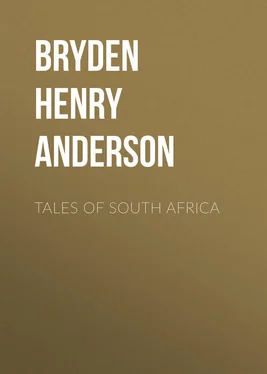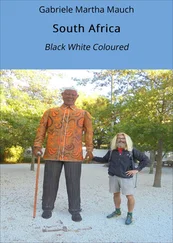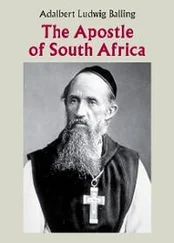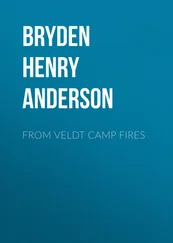Henry Bryden - Tales of South Africa
Здесь есть возможность читать онлайн «Henry Bryden - Tales of South Africa» — ознакомительный отрывок электронной книги совершенно бесплатно, а после прочтения отрывка купить полную версию. В некоторых случаях можно слушать аудио, скачать через торрент в формате fb2 и присутствует краткое содержание. Жанр: foreign_antique, foreign_prose, foreign_language, на английском языке. Описание произведения, (предисловие) а так же отзывы посетителей доступны на портале библиотеки ЛибКат.
- Название:Tales of South Africa
- Автор:
- Жанр:
- Год:неизвестен
- ISBN:нет данных
- Рейтинг книги:4 / 5. Голосов: 1
-
Избранное:Добавить в избранное
- Отзывы:
-
Ваша оценка:
- 80
- 1
- 2
- 3
- 4
- 5
Tales of South Africa: краткое содержание, описание и аннотация
Предлагаем к чтению аннотацию, описание, краткое содержание или предисловие (зависит от того, что написал сам автор книги «Tales of South Africa»). Если вы не нашли необходимую информацию о книге — напишите в комментариях, мы постараемся отыскать её.
Tales of South Africa — читать онлайн ознакомительный отрывок
Ниже представлен текст книги, разбитый по страницам. Система сохранения места последней прочитанной страницы, позволяет с удобством читать онлайн бесплатно книгу «Tales of South Africa», без необходимости каждый раз заново искать на чём Вы остановились. Поставьте закладку, и сможете в любой момент перейти на страницу, на которой закончили чтение.
Интервал:
Закладка:
We rested full twenty minutes, smoked a pipe of tobacco, and then set about completing the rest of our task. The sharp saddle-back, a bridge of rock which crossed another deep ravine between us and the inner mountain, looked excessively nasty. In some places it was as much as four feet wide; in others it narrowed to as little as two. There were about forty yards of it; and in portions the surface was rugged and sharp.
“Come along, Du Plessis,” I said; “the sooner we’re over the better. The rest seems easy enough.”
The broader part of the bridge came first, and admitted of walking for ten yards. Then it narrowed. I went down upon all-fours, and crawled. It was nerve-shaking work; for the bridge fell away sheer on either side, and the drop of nearly two hundred feet meant a horrible death. In the middle of the bridge the space was too narrow even for crawling; it was necessary to sit astride, and so fudge one’s way along for ten or twelve yards. At last the broader part came again, and in five yards more the solid mountain top and safety were achieved. Du Plessis had followed close behind, imitating carefully my tactics. As we stood up upon safe ground again, I noticed that he was deadly pale. He shook his head, as he looked at me ruefully, and wrung the sweat from his brow. “Man!” he said, “if I had not been shamed into following you, I never would have come across that place, no, not for a thousand Verloren Vleis. You are unmarried and a little foolhardy. I am married, and have a wife and six children pulling at my jacket. I didn’t bargain for these adventures; they are only fit for baboons.”
“Come on, Koenraad,” I replied, laughing. “It’s a nasty crossing, I own; but it’s all plain sailing now, apparently.”
We went on over the mountain for twenty minutes; then came a shallow kloof, thickly bushed at bottom; then another ascent, a rough walk of another half-hour; and then, clearing some more bush and low scrub that grew here upon the mountain top, we came suddenly upon an enchanting scene. “The vlei!” we exclaimed in a burst together, then stood and gasped in very pleasure and bewilderment.
Right below us, ringed in by a perfect amphitheatre of mountain, lay an oval sheet of water, its smooth surface, unruffled by a flaw of wind, shining beneath the ardent sunlight like the mirror of a giantess. This vlei – the long-lost vlei, undoubtedly – was about half a mile long by three hundred yards in breadth. Here and there upon the placid water floated troops of wildfowl; and high in the air hung a fishing-eagle or two, keenly intent upon sport beneath. Immediately below us, the lake seemed deep; but towards the far end, it evidently shallowed, and upon one side of that end grew dense masses of reeds. The shores, save where the reed-beds grew, were in places sandy; elsewhere, of rock. Between the water and the mountain sides, which sloped easily downward, and were well bushed, was an outer ring of reddish soil, masked by a park-like growth of scattered acacia thorns. It was now the month of August, and getting towards African spring-time, and, favoured doubtless by the neighbourhood of the vlei, the acacias were already putting forth a pleasant bravery of green leafage. Birds – many of them of brilliant plumage – were in plenty about this gem-like spot. It seemed that here in this secret place Nature had done her utmost to atone for much of the drought and hardship that at this season lay in the wilderness outside.
For five minutes we stood gazing with a sense of rapture at this goodly scene. We looked keenly hither and thither, but could discern no trace of human existence. Then we descended. We reached the water without great difficulty; upon its margin we lay down and drank long and eagerly. Having thus refreshed ourselves, and eaten some of the little store of food we had brought with us, we set out to explore the vlei thoroughly. The chief thing in our minds was to ascertain the fate of Tobias Steenkamp, whether living or dead. And first we settled to search systematically the side upon which we stood. We looked carefully for traces of spoor, yard by yard along the sand fringing the water. Not a footprint could we discover. Once or twice we came across the tracks of klipspringers and leopards, but no sign of human life was there. We turned back, and searched among the groves of thorny acacia, now fragrant with the strong scent of the rich sweet blossoms, but with the same ill success. It was now late in the afternoon; we passed round the end of the vlei, skirted the reed-bed, and then came upon more rocky formation. It was here that I first convinced myself of the gold-bearing richness of the valley. In a crevice of rock, time-worn by long ages of water-wear and decay, I picked up three smallish nuggets. I am afraid this success rather threw us off the search for Tobias Steenkamp, of which we had already begun to despair. Several times during the day we had raised our voices and hallooed loudly, in faint hopes of an answer. The cliffs eagerly returned us echo after echo, but there was nought else. For the rest of the short afternoon time we scrambled about the rocks, peering into crannies and basins. We had fair success, and by evening had between us gathered some fourteen ounces of gold, all in nuggets.
It was now sundown; already the pelicans had arrived, and were sailing about the sky in marvellous intricacies; the light was going fast, and we must prepare to camp for the night. We had told our men at the wagons not to expect us till next day; they would be therefore under no anxiety. We picked a place not far from the water, where the view was open, and danger from the approach of night ferae minimised. We chose a smooth sandy spot under a wall of rock. In front we made two good fires, and then, having eaten a scant supper, we sat smoking and talking beneath the warm starlight. It was about nine o’clock; we were both becoming drowsy, when Du Plessis suddenly sat bolt upright and listened breathlessly. “Did you hear that?” he whispered in a low, intense voice. “No,” I said, sinking my voice too, for the man’s strange demeanour rather awed me.
“I heard a man groan – or a spook ,” he said.
Now, I am not a believer in spooks at any time; yet it was a wild, eerie place, and the senses of these Boer hunters are so preternaturally quickened by long acquaintance with savage life, that I knew Koenraad must have heard something.
I listened intently, and again we both heard a faint groan, as of a man in pain.
“Allemaghte!” whispered Du Plessis, “what, in the name of the Heer God, can it be?” A moment later he clutched me by the arm, and pointing with his right hand, whispered fiercely: “Look! look!”
The moon was now up and shining brightly, and the valley had passed from the dimness of the starlight. I looked where the Boer was pointing, and saw something that sent a shiver down my back. Certainly there was a shapeless something crawling slowly towards the water on our left front, one hundred and fifty yards away. Again came the faint groan we had heard.
“This is bosh,” I said. “It’s a man, undoubtedly, and he’s in pain. It may be your cousin. Come and look.” I sprang to my feet, picked up my revolver, and started off. Du Plessis pulled himself together – he had need, for he was a firm believer in spooks – and followed closely. We approached the creeping thing – it looked more like a man. I hailed it, and again a low groan came. We reached the dark object. It was a man, or the remains of one, emaciated, half-clad in tattered rags; and it crawled upon all-fours, dragging one leg. It was not a Boer – not Tobias Steenkamp. In a flash it came into my mind that here was the second figure, of my strange dream.
“Who are you?” I said.
“Water, for God’s sake!” was all the poor wretch could utter. I ran to the water, filled the top of my felt hat, and came back. The tattered figure drank eagerly.
Читать дальшеИнтервал:
Закладка:
Похожие книги на «Tales of South Africa»
Представляем Вашему вниманию похожие книги на «Tales of South Africa» списком для выбора. Мы отобрали схожую по названию и смыслу литературу в надежде предоставить читателям больше вариантов отыскать новые, интересные, ещё непрочитанные произведения.
Обсуждение, отзывы о книге «Tales of South Africa» и просто собственные мнения читателей. Оставьте ваши комментарии, напишите, что Вы думаете о произведении, его смысле или главных героях. Укажите что конкретно понравилось, а что нет, и почему Вы так считаете.












